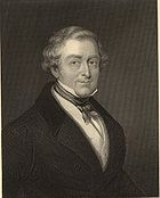
statesman
who served as Prime Minister of the United Kingdom
from 10 December 1834 to 8 April 1835, and again from 30 August 1841 to 29 June 1846. While Home Secretary
, Peel helped create the modern concept of the police
force, leading to officers being known as "bobbies" (in England) and "Peelers" (in Ireland). While Prime Minister, Peel repealed the Corn Laws
and issued the Tamworth Manifesto
, leading to the formation of the Conservative Party out of the shattered Tory Party.
Peel was born in Bury
, Lancashire
, England, United Kingdom to the industrialist and Member of Parliament Sir Robert Peel, 1st Baronet
.
I feel and know that the Repeal [of the Act of Union 1801] must lead to the dismemberment of this great empire; must make Great Britain a fourth-rate power in Europe, and Ireland a savage wilderness.![]()
If the spirit of the Reform Bill implies merely, a careful review of institutions, civil and ecclesiastical, undertaken in a friendly temper, combining, with the firm maintenance of established rights, the correction of proved abuses, and the redress of real grievances,—in that case, I can for myself and colleagues undertake to act in such a spirit and with such intentions.![]()
I have read all that has been written by the gravest authorities on political economy on the subject of rent, wages, taxes, tithes.![]()
I shall leave a name execrated by every monopolist...but it may be...sometimes remembered with expressions of goodwill in the abodes of those whose lot it is to labour and to earn their daily bread in the sweat of their brow, when they shall recruit their exhausted strength with abundant and untaxed food, the sweeter because it is no longer leavened by a sense of injustice.![]()

